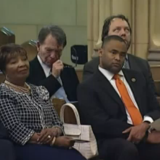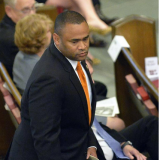Newsroom
The pews of the church were full of family, friends and local and national leaders. Fort Worth Mayor Betsy Price, several city council members and U.S. Reps. Marc Veasey (D-Fort Worth) and Steny Hoyer (D-Maryland) were among those in attendance.
Congressman Marc Veasey at the funeral service for Jim Wright, the former Speaker of the House, at First United Methodist Church in Fort Worth, TX, Monday, May 11, 2015.Max Faulkner Star-Telegram
"Anyone who supports taking American jobs and military service opportunities from Americans and lawful immigrants is betraying the American citizens they claim to represent," the lawmakers said of the push by Denham and others, labeling their actions "unfathomable."
Brooks said he plans to appear before the Rules panel to advocate for his amendment and for nixing the existing provision, which was authored by Rep. Ruben Gallego (D-Ariz.).
Former U.S. House Speaker Jim Wright may not have wanted all the fuss.
But on Monday, city streets will be closed off around the church where his funeral service will be — and shuttle buses will deliver those who want to attend — as thousands of people are expected to try to say one final goodbye to the legendary politician.
Ten years ago when U.S. Rep. Marc Veasey proposed to his wife, Tonya, on a downtown street corner, one of Fort Worth's most cherished individuals was part of the event.
Charles Joyner, the double amputee known as Fort Worth's unofficial greeter, was in his usual spot on his corner at Third and Houston streets when Tonya showed up to meet her date for dinner at Reata restaurant.
When Veasey arrived shortly afterward to greet Tonya, Joyner told him, "Mister, you should have some flowers for this beautiful young lady."
"America has lost one of its most distinguished and dedicated public servants, I have lost a great friend and mentor, and the Dallas-Fort Worth Metroplex has lost a tireless advocate whose impact in the region has been broad and deep. From transportation and flood control to aviation and economic prosperity, Speaker Wright was a tremendous champion for North Texas." — U.S. Rep. Marc Veasey, D-Fort Worth
WASHINGTON, D.C. – Congressman Marc Veasey released the following statement marking the passing of former Speaker of the House, Jim Wright:
"With Speaker Jim Wright's passing, America has lost one of its most distinguished and dedicated public servants, I have lost a great friend and mentor, and the Dallas-Fort Worth Metroplex has lost a tireless advocate whose impact in the region has been broad and deep. From transportation and flood control to aviation and economic prosperity, Speaker Wright was a tremendous champion for North Texas.
Seven Republicans crossed the aisle to support the second amendment, sponsored by Rep. Marc Veasey (D-Texas). It was approved in a 34-29 committee vote.
A second amendment, added by Democratic Rep. Marc Veasey of Texas, is asking the Defense Department to conduct a review of how including DACA recipients among the military's recruits would affect the armed forces. It passed in the same committee 34-29, gaining the support of more Republicans.
Participaron escuelas preparatorias y de ballet folklórico así como líderes cívicos, entre los que se encontraban Roberto Alonzo, representante estatal de Oak Cliff, Mónica Alonzo, representante del distrito 6 en el concilio de Dallas y el congresista Marc Veasey; otras personalidades incluyeron los presentadores de noticias de Telemundo Norma García y Enrique Teuteló.

